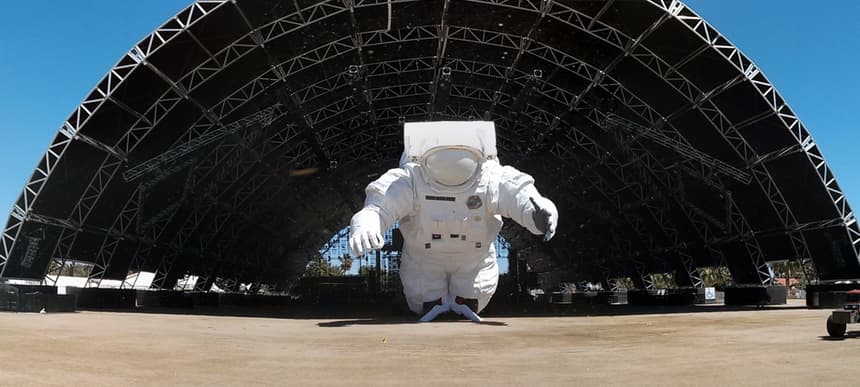
How is the live music industry coping with the effects of coronavirus?
Over the last couple of weeks, the live music industry has gradually come to a grim realisation: that each one of their events would be cancelled, or postponed indefinitely. The spread of Covid-19 has now ground things to a complete standstill – in the UK at least, as well as in many other parts of the world. Parties have been cancelled, clubs shuttered and DJs left without any income for the foreseeable future.
While globally-renowned events like Coachella and Glastonbury have been called off, there should be equal if not greater concern for the smaller festivals, promoters and grassroots venues that will struggle as a result, as well as the musicians, DJs, record shop owners, labels, booking agents and other industry figures operating on small margins.
London-based party crew Make Me was due to celebrate its 12th birthday at Corsica Studios next Friday. “As you can imagine, this was a big disappointment for us as a crew and for the artists involved in the event,” says founder Ben Rubin. “This one was particularly important as we invested a huge amount of time on programming a bunch of super exciting new artists, most of whom we’ve not worked with before.”
The amount of time that the shutdown continues for will have a significant bearing on the impact it causes across the industry, he stresses. “A few weeks and we may quickly get back to something relatively close to normal. A few months and we could be looking at major structural changes across the entire scene, with venues forced to close and independent promoters in particular put out of business. Hopefully it won’t come to that, and we know many of our colleagues are working night and day to make sure the scene gets the support it needs.”
“Most of our Bugged Out events have either been cancelled or postponed until later in the year,” says Johnno Burgess, founder of the long-running club series. “Even before the mass gatherings ban was in place, we were in the process of moving events we had planned in March as it didn’t feel responsible to go ahead with them. It’s hugely concerning, not just the financial impact of shows not going ahead in the short term but whether all the venues we regularly use will survive this.”
“It’s uncertain how long this will continue for or how long I’ll be without income”
The UK government’s vagueness on the issue has been a source of concern for venue owners and promoters. In his address on Monday, Boris Johnson did not force venues to close but instead advised people to stay away, meaning insurance could not be claimed and there would be no relief on rent. It’s something that has caused a great deal of anger within the UK music scene. “If the government are going to cancel events and mass gatherings we need dates and they need to stick to them and not repeal the ban before the period they have enforced,” states Burgess.
“Being solely a DJ who gets paid from shows, the ban of mass gatherings has meant my shows until at least May have all been cancelled without question,” says Barely Legal. “It’s uncertain how long this will continue for or how long I’ll be without income. All of us in the music industry are suffering, and I really hope everyone is coping okay. The network of people who I surround myself with in the scene are a strong community who look out for one another so hopefully everyone will support each other where possible.”
“I hope independent and small businesses don’t come out the other side financially broken as that will be heartbreaking,” she continues. “I’ve definitely been thinking of ways to source income alternatively, but more so just ways to keep my creativeness flowing and not go insane.” She believes that much more could be done by the government to assail fears by creatives and freelancers working in the industry, suggesting they freeze rent payments for those forced out of work by government policies.
“In the short term customers keeping hold of their tickets for rescheduled dates rather than just asking for an immediate refund would be a big help”
Lack of human contact during self-isolation and stress over money is no doubt taking a toll on many people’s mental health. So what can music fans do to help the situation? “I think in the short term customers keeping hold of their tickets for rescheduled dates rather than just asking for an immediate refund would be a big help,” Burgess suggests. “Some theatres have been asking customers to see tickets as donations – for the time being – to keep them afloat while they work something out for them in the future.”
Artists like Charli XCX and L Devine have been turning to live streaming amid mass concert and tour cancellations, although it goes without saying that this can’t be monetised in the same way as a live event. Other artists are putting out merch and uploading releases to Bandcamp (which is from today waiving its revenue share on all releases for 24 hours) in order to make up for lost income.
“I don’t produce so I can’t tell people to buy my music from Bandcamp, but I can encourage people to buy my peers’ music,” says Barely Legal. “I personally just need to be productive and record radio shows, mixes and content and be ready for the other side of this.”
DJ, producer and More Time label head Ahadadream was forced to cancel or postpone his planned gigs around the UK for the foreseeable future as well as a Boiler Room broadcast. He also suggests people buy direct from Bandcamp, adding: “All of this still probably won’t be enough income for most artists to survive, so we do really need some kind of support from the government. ”
“Bandcamp is great as money goes directly to artists, but we mustn’t forget the independent record stores who are such a vital part of dance music,” Rubin adds. “Buy brand new vinyl, it’s the lifeblood of the scene.”
“People who’ve made significant amounts of money over the past few years (generally I’m looking at you, DJs) should be putting cash back into the scene in whatever way possible.”
“People who’ve made significant amounts of money over the past few years (generally I’m looking at you, DJs) should be putting cash back into the scene in whatever way possible,” Rubin says. “You don’t need to publicise it, just do it. The long term survival of the thing that made you successful could well depend on you putting some value back into the system.”
Where the situation right now is not looking good, there are many positives to be found in the way the industry is pulling together, with the current Bandcamp drive to support artists and Resident Advisor’s Save Our Scene campaign, which asks fans to attend live streamed events and skip refunds. Organisations like the Music Venues Trust are fighting the corner for grassroots venues, offering advice for places losing money, and FOLD in Canning Town is just one venue using its emptiness for good, offering its space to the NHS should it be needed for critical services.
“We should remember that dance music is first and foremost a community and cultural movement, as well as being an industry,” Rubin says. “Even though the raves aren’t running and the cash has stopped flowing for the time being, the importance of our collective passion for music and the community we’ve all built around it should not be dulled. It is more important now than ever. We will come through this stronger than before.”
If you are struggling with your mental health as a result of the coronavirus pandemic, here are some links to services that may be able to help: samaritans.org, giveusashout.org, mind.org.uk.













